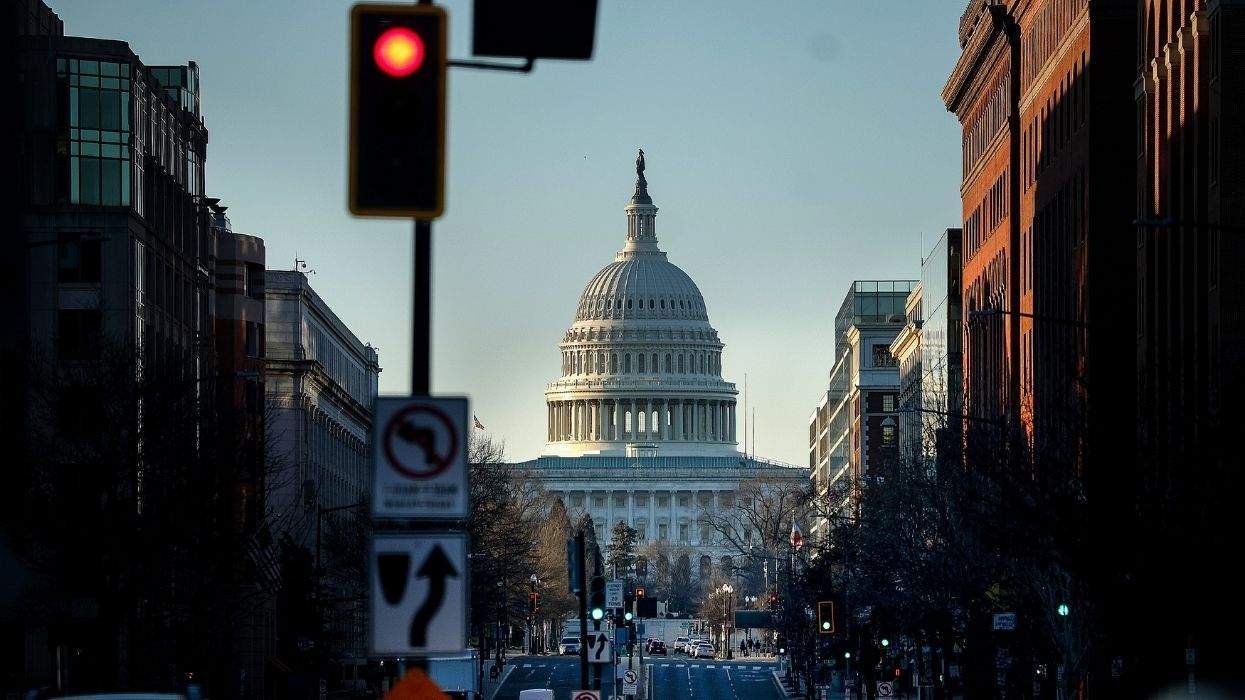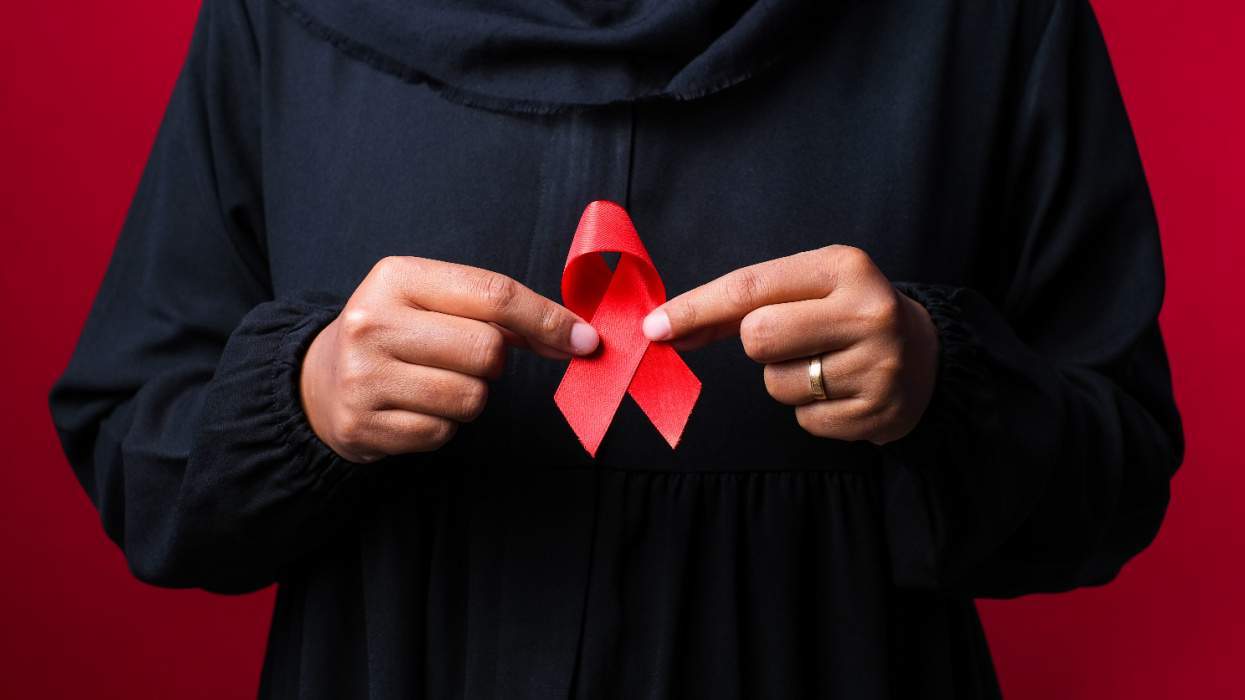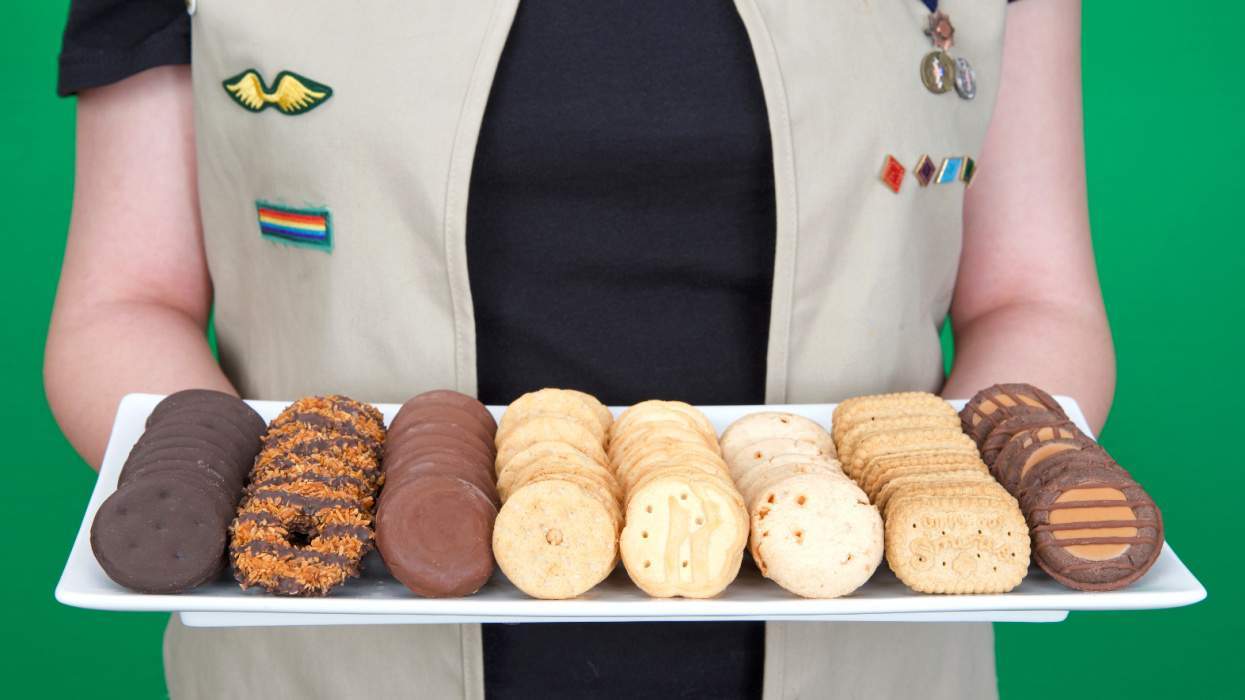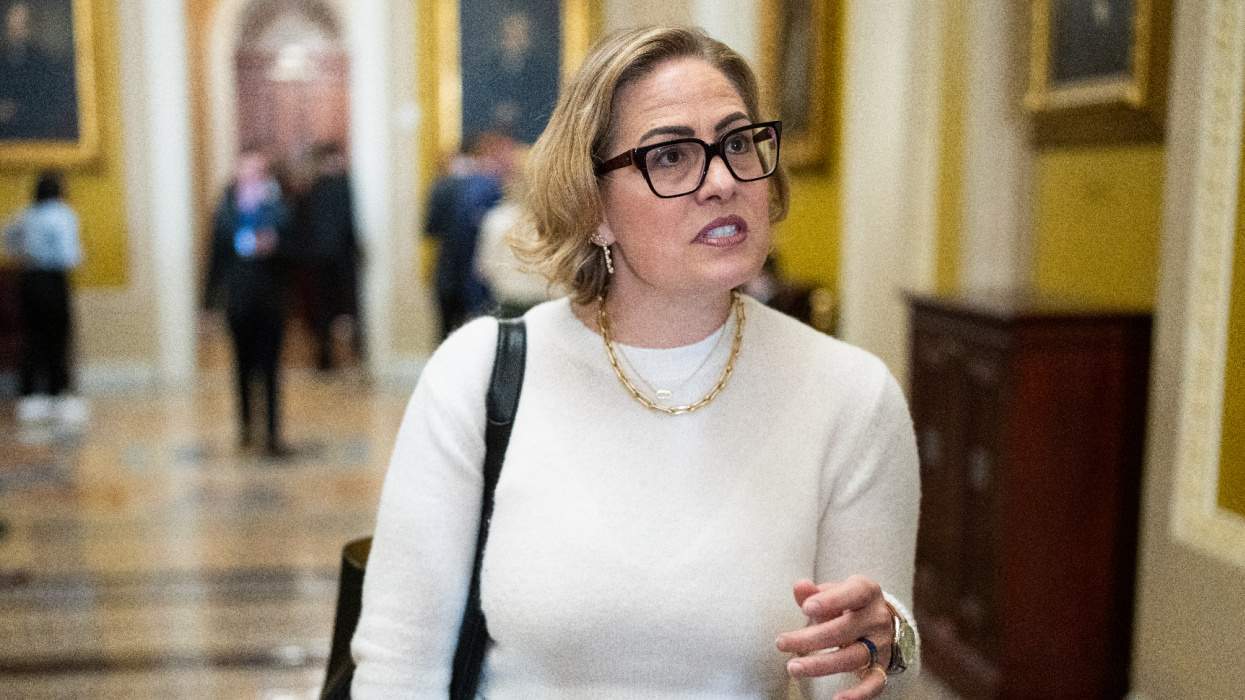A queer women’s road-trip movie rife with severed heads, bumbling bad guys, dyke bars, all-women make-out parties, raucous lesbian sex, and a psychedelic Miley Cyrus cameo has been long overdue. Now Ethan Coen and Tricia Cooke’s high-octane Drive-Away Dolls delivers on all of that and more with the wildest ride ever to be had in a ’90s-era Dodge Aries with “Love is a sleigh ride to hell” emblazoned on the trunk.
Keep up with the latest in LGBTQ+ news and politics. Sign up for The Advocate's email newsletter.
It’s also a period piece that’s a love letter to lesbian culture at the turn of the new millennium. Stars Margaret Qualley and Geraldine Viswanathan sport high-waisted jeans, oversized belt buckles, cut-off tees, and chambray shirts as their characters Jamie and Marian (respectively) traverse the highways and byways from Pennsylvania to Tallahassee in search of heralded dyke bars of yore. Coen and Cooke set out to make a movie about queer women that’s free from the weight of “importance” often attached to LGBTQ+ films. Yet in doing so, they made a funny, sexy flick with lesbian lead characters free from trauma and pathos that is important and maybe even gently radical.
“We don’t often get to see your stories that aren’t really centered around the struggles of coming out. It’s such a lighthearted, goofy, silly movie — but it’s also a very, very gay movie,” Viswanathan says. “It feels nostalgic to the ’90s, but it’s pretty progressive and forward-thinking.”
It’s no surprise that Drive-Away Dolls depicts lesbians in the not-so-distant past with authenticity. Cooke, who is queer, conceived of the idea for a romp of a film titled “Drive-Away Dykes” with a friend decades ago. A long-time editor and producer on her now-husband Ethan Coen’s films with his brother Joel Coen, Cooke says queerness is baked into the film’s DNA.
“I’m a queer filmmaker, so having queer characters as leads in a film felt both natural and important to me. I’d grown up seeing gay characters in movies, but rarely did the movies have happy endings, and they were never irreverent or lighthearted,” Cooke says.
When she and Coen wrote the script in the aughts, even with Coen’s Best Picture Oscar win for No Country for Old Men under his belt, they couldn’t get a fun lesbian film without that “importance” element made in Hollywood, she says.
For Qualley and Viswanathan, Drive-Away Dolls is right on time, and they couldn’t be more excited to star in the film from Coen and Cooke.
“The script is outstanding. It’s hilarious. The roles are so unique and fantastic. I just wanted to be a part of it. I wanted to learn from them [Coen and Cooke],” Qualley says. “I feel so lucky to have ultimately been a part of this movie, and to get to know Geraldine, who’s an incredible actress and human.”
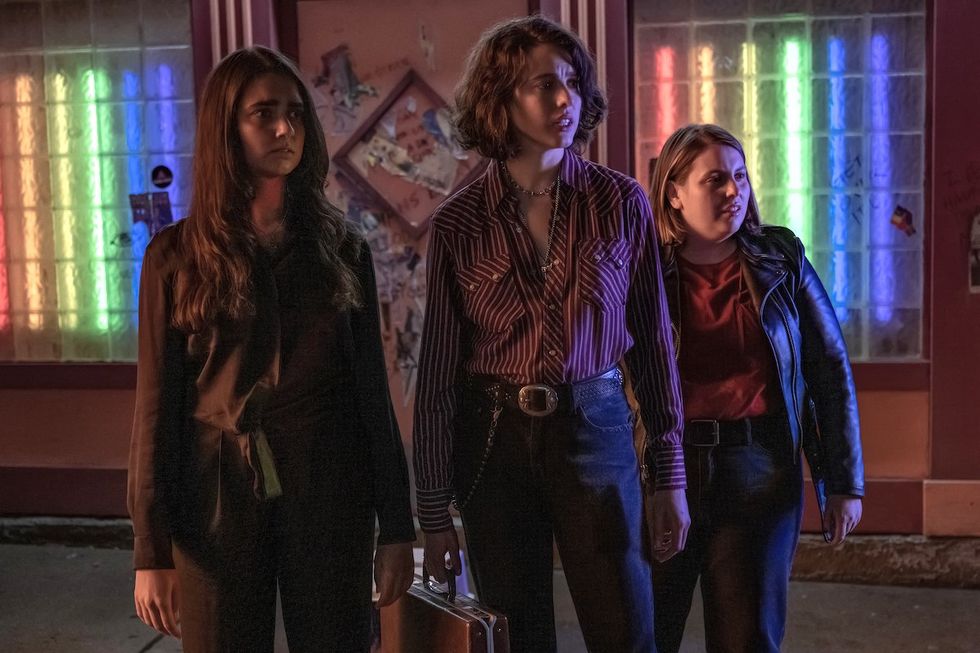
The film follows Jamie, a loveable lesbian lothario with a thick Texas accent — who’s going through a breakup with her soft-butch cop girlfriend played by Beanie Feldstein — and her best friend Marian, a buttoned-up lover of Henry James novels who hasn’t had sex in ages. Itching for a change of scenery, the duo embarks on an adventure to Florida where Marian has family, all the while unaware that the beige sedan they’re delivering to the Sunshine State is loaded with illicit cargo. Jamie picks up women at dyke bars down the coast while Marian patiently reads James under flickering neon signs in dingy motel lobbies. Meanwhile, they’re in not-so-hot pursuit by heavies under orders from a character played by Colman Domingo, whose goal is to retrieve the cargo. On the road, and while Jamie is bent on getting her best friend laid, the two tap into something deeper.
“A lot of this was from Tricia’s real-life experience,” Qualley says. “It’s done from the inside of the world. It’s not observational. It’s kind of like the way that family lovingly makes fun of family. It’s a very welcoming, warm way of doing that.”
Leaning into that insider POV, the film is peppered with Easter eggs from lesbian history for queer viewers. For instance, the dog Jamie shares with Feldstein’s Sukie is named for Alice B. Toklas. Cooke created a research document with some notes on queer history that she shared with her stars for context, Viswanathan says.
“To me, this movie is nostalgic,” says Qualley, who’s known for Once Upon a Time in Hollywood and The Leftovers. “Geraldine and I were actually hanging out on set and having fun and getting to know each other and goofing around. It felt like what I would imagine a movie set would’ve felt like in the ’90s.”
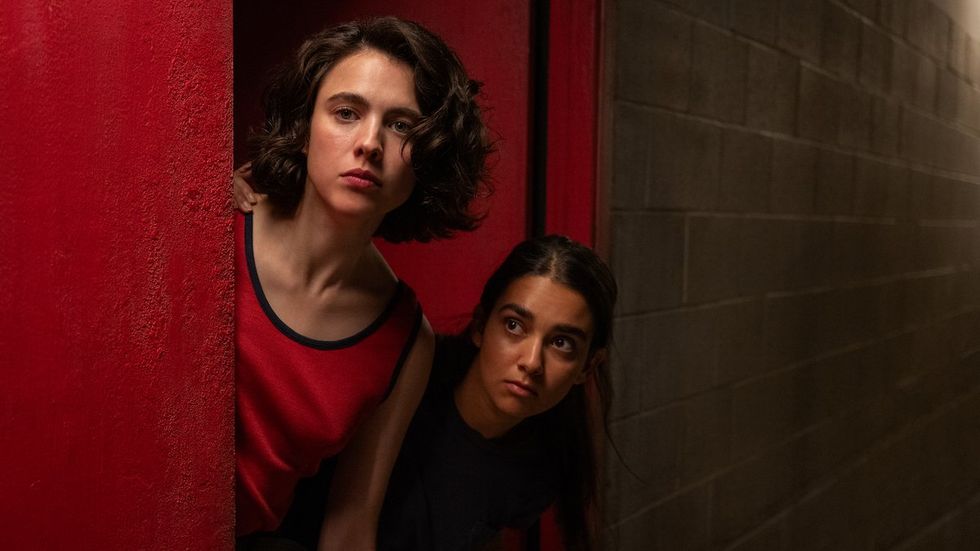
Lesbian bar scenes in studio movies are relatively rare, so much so that a queer women’s bar scene in 1996’s The First Wives Club is still memorable. And Drive-Away Dolls pays homage to those queer spaces inspired by bars like New York City’s Cubbyhole, an occasional haunt for Cooke back in the day. Viswanathan, a breakout in the 2018 comedy Blockers and 2023’s The Beanie Bubble, says the process of shooting those scenes felt like“time travel to the ’90s, when people still met in bars.”
“The costumes were so fun. And [the bars in the scenes] were packed with this bunch of women of all different walks of life. I wish we could go to these bars,” Viswanathan says.
At a time when lesbian bars are disappearing and right-wing politicians seek to erase queer people and history by way of hundreds of anti-LGBTQ+ bills, Drive-Away Dolls preserves a piece of queer history and offers a happy story of queer love for modern audiences.
“When we’re talking about underrepresented communities, I personally would just want to get to the place where we’re just allowed to be as ridiculous and silly and fun and free as the majority,” Viswanathan says. “I’m excited for this movie to be a part of the conversation and part of [the] canon of queer movies.”
Drive-Away Dolls is in theaters beginning Feb. 23.




